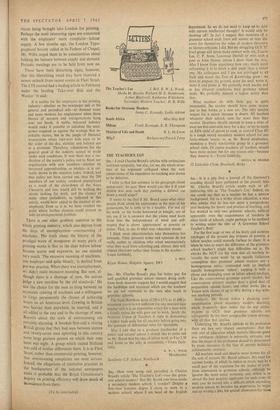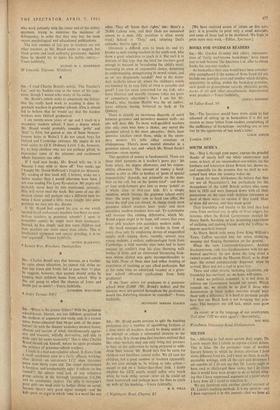SIR,—IL is a pity that a journal of the Spectator's
standing should have published at the present time Mr. Charles Brand's article under such an all- embracing title as 'The Teacher's Lot.' Indeed, no one could say that as a teacher he has a narrow background, but as a writer about education, a man whq admits that he has not spent a postgraduate year studying the theory and practice of teaching, and has worked in only two gratumar schools, without apparently even the • acquaintance of teachers in other kinds of schools, ought perhaps to be confined to writing under the title of 'A Grammar School Teacher's Beef.'
For the first page or two of his lively and accurate catalogue of the present day irritants of poverty, a fellow teacher could scarcely forbear to cheer. It is when he tries to assert the difference of the grammar school teacher's plight that difficulties set in. He attacks the NUT for the view that all teachers do 'exactly the same work' by an equally fallacious • assumption that grammar school masters are a homogeneous entity, contrasted with an implied equally homogeneous 'others'; capping it with a cheap and damaging sneer at infant school teachers. Like the conscientious grammar school teacher, the conscientious primary teacher does a good deal of preparation outside hours, and often works like a Trojan with classes of up to fifty during a day with- out marking periods.
Similarly. Mr.' Brand makes a shocking over- simplification about secondary modern teaching; which frequently does better for its top ability • streams in GCE than grammar schools not . infrequently do for their comparable lowest streams,, with all that that implies.
Underlying Mr. Brand's attitude to his profession there are two very chancy assumptions: that the only end of education which matters (Heaven grant him intelligent children) is university entrance, and that the shape of the profession should be determined by panic measures in the face of current technical achievements overseas.
All teachers need and deserve more money for all the sort of reasons Mr. Brand adduces. His need for current books, of which lie makes so much, may be a small part of the argument for the justice of sixth- form allowances in grammar schools, although he ignores the more usual economic one, which is to attract the best possible applicants for such posts. I f next year he moved into a difficult urban secondary modern school, to broaden his experience, he might end up writing a plea for special allowances for those
who work patiently with the lower end of the ability spectrum, trying to minimise the incidence of delinquency, in order that they may buy the most recent psychological and educational publications.
The real enemies of fair pay to teachers are not other teachers, as Mr. Brand seems to suggest, but block grants and local authority parsimony. Against these he should try to ignite his public outcry.— Yours faithfully,
RICHARD M. E. HENDERSON 20 Laneside, Edgware, Middlesex
*







































 Previous page
Previous page